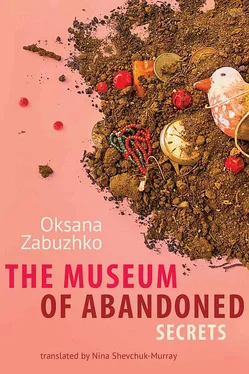And for an instant I hurt again with a hot cramp in my stomach, with that retrospective, and therefore meaningless, teenage jealousy—as if this picture of yourself that you remember sends me tumbling twenty years back, right along with you, frozen at my school desk, unable to take my eyes off the most hopelessly unattainable boy in our class. You don’t even notice me—you wouldn’t notice the girl I was then, an acne-pocked, straight-A student with a wet-noodle braid on my shoulder—you never would, except maybe to politely open a door for me. Boys like you from good families, plied with early success, always have good manners because you have no need to draw attention to yourselves with stupid pranks; nothing better than positive life experience to engender friendliness—that superficial, tepid good-naturedness, like a constant body temperature, that is utterly impervious to aggression—or sympathy.
“Incredible,” I say, shaking my head, but you don’t understand; you’re not on the same wavelength, and you continue surfing along on your own frequency, registering my comment as a quick burst of applause for your past triumphs with girls. You toss it, with a small clink, into that twenty-years-ago drawer in your mind; and so we stay, just as we were—each with our own drawers whose contents haven’t mixed, haven’t even been put out side by side and really compared. And that’s what I meant by incredible.
How could we hope to conduct our dead-relatives exchange—to cross these ghostly bloodlines that stretch into the most impenetrable reaches of time—if we can’t even manage to marry our younger selves, that boy and that girl who used to fall in love with other girls and boys, who both lay awake at night in different cities without the slightest inkling of each other’s existence? And the worst of it is that they are still here—that boy and that girl. They must be if I am still capable of such idiotic jealousy toward your high-school sweetheart—never mind that I met her decidedly in the present tense, precisely so that I could get over it once and for all, because the comparison now was not at all in her favor. She turned out to be a rather dour, prickly, thick-boned, and lumpy-looking matron, like the former project engineers who now have to sell secondhand clothes off cots in street markets; and she had those deep-set eyes—like soot-black hollows—that with the passing of time seem to be increasingly the result of constant crying or no less constant drinking, aging their owner beyond her years.
On top of that, she didn’t even smile when we met, which leads me to conclude that her life experience thus far has not proved particularly conducive to friendliness—it is quite possible that first schoolgirl love remains her only bright spot—and so I ought to pity her, both as a fellow human being and as a woman. But like hell I can, because I am still not sure which woman it is that you see in there: This current one, or this one and the one from back then, together, a shadowbox backlit with a time-denying glow from another dimension. If it’s the latter, the deck is stacked against me because the only me you know is the present-day me, cut with an ax at a year-old whorl—a single thin line, no matter how wonderful the shape it draws.
“You’re like a little bird… my schoolgirl…”
“How am I a schoolgirl?”
“It’s your body—it’s like a teenage girl’s. It’s fantastic.”
“What is?”
“That it has managed to stay this way.”
“What a prick!”
“Oh, am I now?” you say, very agreeably, turning me on my back. Your hands’ capacity to coax out of my flesh musical tones—so varied in pitch and color, audible to myself alone (a little like the minimalists, like Philip Glass, only this makes Glass look like a rookie; he couldn’t have dreamed of such a palette…)—once again forces me to enter a different kind of listening: with my eyes closed, focused completely on the pictures that flash and flicker on the insides of my eyelids, like a symphony—first come pale fronds of fern, unfurling slowly, as if underwater, with the fluid precision of Japanese prints; then the surface breaks into a rich dollop of tropical emerald green that grows darker and darker until it congeals and hardens into the aching point of my nipple, and at exactly the moment when I am about to cry out with real pain, the pressure releases, spills into a caressing flood, and a round, fiery-orange sun rises triumphantly above the horizon. The joy makes me laugh out loud. I am now all living, spinning wet clay in the hands of a master potter, a musical sculpture.
“You’re not supposed to applaud after the overture,” you say from somewhere in the dark, as if already inside me, and your hands keep moving with merciless precision—this gift of yours—and I begin to die again, as usual (How do you do that?) long before you enter and fill me entirely; and when you finally do, all that’s left of me is a form, a mold—warmed with the gentle glow of gratitude, fluid and flexible—into which you pour all of yourself with the desperate force of nature, the all-consuming fire and rock. Oh you, you, you, my love, my nameless one (in these moments you don’t have a name, cannot be named any more than infinity itself)—a primordial boom, a flash of newly born planets, an eclipse, a scream. Of course, this is incredible luck; you and I have been unbelievably, unfairly lucky—so lucky it’s frightening. Why us? And what price shall we be asked to pay for this? But just think about it—I murmur in blissful lethargy, my nose tucked securely into your not-yet-cooled neck, with its sweat, with its warm, spicy (Cinnamon? Cumin?), manly scent—millions of people must have lived their whole lives and never experienced anything like this (although, come to think of it, how would we know?—but something inexorably fills happy lovers with this unshakeable certainty that they are the first since creation). And that’s why there isn’t a single reason (and if there had been, it’s been washed away with the tidal wave), not a single good reason, to rewind and reflect upon that “schoolgirl” and the fact that you persist—as if you’d be an idiot not to—in your stubborn, hand-callusing work of merging me—in the sum total of all emotions and sensations, sensory memory included—of binding me in with your first love.
This would be the moment to ask with affected cynicism something like, “What, you’re an expert in schoolgirls? Nymphophile? How exactly would you know?” But a question like that would do no more than disrupt the mining machinery of memory—an intrusion as careless as calling after a sleepwalker as he makes his way along the edge of a roof, and with the same risk of having the roused man tumble to his death. No, let it all be; let it go as it goes. I’m not the one to take a wrench to someone else’s brain. And really shouldn’t I be flattered? Or at least reassured? What more reliable proof of his undying love can a man give a woman than to plug her (to borrow from electrical engineering) into the network of the first female images set into the concrete foundation of his imagination: his mother, his sister, the girl next door? (And women do this, too: all of us plug each other into one thing or the other, ready to replace breakers, find missing wires, and wrap it all thickly with insulation tape until—boom!—the circuit shorts with a jolt.)
Dear sisterhood: Let us all love our mother-in-laws, for they are our future; they are the women we will become in thirty years (otherwise, your beloved would never have noticed you, would never have recognized you). Let us love our rivals, past and present, for each one of those women has something of ours, something that we ourselves fail to notice and prize and that, for him, is sure to be most important. Shit, does this mean I have something in common with that droopy-faced hag with eyes like burnt holes in a blanket!?
Читать дальше












